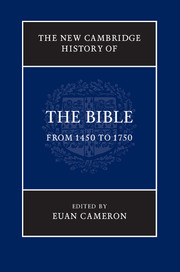Book contents
- Frontmatter
- Contents
- List of figures
- List of contributors
- Preface
- List of abbreviations
- Introduction
- PART I RETRIEVING AND EDITING THE TEXT IN EARLY MODERN EUROPE
- PART II PRODUCING AND DISSEMINATING THE BIBLE IN TRANSLATION
- PART III PROCESSING THE BIBLE: COMMENTARY, CATECHESIS, LITURGY
- 16 Authority
- 17 Theories of interpretation: The quadriga and its successors
- 18 The importance of the Bible for early Lutheran theology
- 19 The Bible in Reformed thought, 1520–1750
- 20 The Bible in Roman Catholic theology, 1450–1750
- 21 Orthodox biblical exegesis in the early modern world (1450–1750)
- 22 The Bible in the pulpit, 1500–1750
- 23 The Bible in catechesis, c. 1500– c. 1750
- 24 The Bible in liturgy and worship, c. 1500–1750
- PART IV THE BIBLE IN THE BROADER CULTURE
- PART V BEYOND EUROPE
- Afterword
- Select bibliography
- Select Bible bibliography
- Index
19 - The Bible in Reformed thought, 1520–1750
from PART III - PROCESSING THE BIBLE: COMMENTARY, CATECHESIS, LITURGY
Published online by Cambridge University Press: 05 August 2016
- Frontmatter
- Contents
- List of figures
- List of contributors
- Preface
- List of abbreviations
- Introduction
- PART I RETRIEVING AND EDITING THE TEXT IN EARLY MODERN EUROPE
- PART II PRODUCING AND DISSEMINATING THE BIBLE IN TRANSLATION
- PART III PROCESSING THE BIBLE: COMMENTARY, CATECHESIS, LITURGY
- 16 Authority
- 17 Theories of interpretation: The quadriga and its successors
- 18 The importance of the Bible for early Lutheran theology
- 19 The Bible in Reformed thought, 1520–1750
- 20 The Bible in Roman Catholic theology, 1450–1750
- 21 Orthodox biblical exegesis in the early modern world (1450–1750)
- 22 The Bible in the pulpit, 1500–1750
- 23 The Bible in catechesis, c. 1500– c. 1750
- 24 The Bible in liturgy and worship, c. 1500–1750
- PART IV THE BIBLE IN THE BROADER CULTURE
- PART V BEYOND EUROPE
- Afterword
- Select bibliography
- Select Bible bibliography
- Index
Summary
The Bible in Reformed Protestantism was treated both theologically and textually, and the focus of attention was on the literal, historical–grammatical reading of the text. Interpretation, translation and editing focused on the received canonical text and its various meanings, with particular attention to the problems presented by the relationship between individual parts of the Bible and the whole. Beginning with the circle of Reformed biblical scholars in Basel, Zurich and Strasbourg the tradition that emerged along the Upper Rhine was deeply indebted to the critical methods of Erasmus, with an emphasis on languages and the rhetorical sense. Jewish sources, including the Bomberg Bible, formed a major part of Reformed thinking in both the Reformation and post-Reformation periods, not only on account of the vowel points but through the questions of interpretation posed by the Hebrew tradition. Methodologies of reading occupied the Reformed writers, with Martin Bucer, Heinrich Bullinger and Wolfgang Musculus, among others, producing works on correct approaches to Scripture and the necessity of ancient languages. Interpretation, however, was not an end in itself, and a distinct part of the Reformed approach was continued emphasis on the role assumed by exegesis in serving the practical, devotional life of the church. A significant question in this regard was the respective roles of the Spirit and the human authors, and among the Reformed a range of responses was to be found. This would shift towards a strong doctrine of verbal inspiration in the seventeenth century as the Reformed Orthodox sought to respond to the philosophical positions of Spinoza and the more radical implications of textual criticism. Likewise in the theological readings of Scripture important differences can be detected concerning such questions as the Christological reading of the Old Testament; the Zurich scholars, for instance, found typologies for Christ throughout the text, while Calvin, as has been recently argued, was more reticent. The Reformed emphasis was on the reading of the whole text, and this was reflected in the fecund culture of biblical commentary on all the books of the Bible.
The Reformed scholars were deeply rooted in the study of Hebrew and Greek, and a major part of the intellectual project of the Reformation was the establishment of reliable editions of the original languages.
- Type
- Chapter
- Information
- The New Cambridge History of the Bible , pp. 462 - 488Publisher: Cambridge University PressPrint publication year: 2016
- 1
- Cited by

